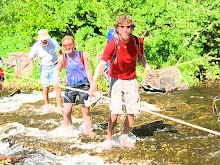The "Other" Part of Town
I want to rock your Gypsy soul/
Among the 15,000 or so inhabitants of our town, roughly one thousand are Roma. They mainly live on one unpaved street. It’s a slum. Many families don’t have running water or consistent electricity and their roofs leak. Unemployment is nearly ubiquitous. Almost no one has graduated from high school. In other words, if you were to look up the phrase “cycle of poverty” somewhere, this community’s picture would be right there.
The street's called Edinstvo, the Macedonian word for "unity" or "harmony." I couldn't dream up a more bitterly ironic name for this part of town.
The attitude on the part of Macedonians towards Roma in town is one of, if not outright discrimination, severe marginalization. The Roma are, in every sense of the word, "others" and there seems little interest among Macedonians to ever change that.
I was walking from school one day with two seniors from the debate team. Along the way we crossed paths with two Roma teens who attend our English class. I stopped for a second to chat with them about our schedule and then continued on. My Macedonian students looked at me strangely and one asked, "What business do you have with those people?" I explained, but they still seemed puzzled. Their reaction mirrored a common belief here: the Roma can't be helped, they don't want to be helped, so they shouldn't be helped. Don't bother.
Of course, the situation is more complex than the surface suggests. We've heard various, conflicting reports about the municipality' efforts to aid and integrate the community. Did they offer to build new, safe housing for the Roma? Or did they attempt to bulldoze half the settlements because they're an eyesore? Were the candidates for mayor in last month's election making legitimate promises to help the Roma or simply manipulating the most desperate community for votes? With some notable exceptions, Jillian and I have not found a lot of good will toward the Roma and certainly nothing that would translate into municipal support. But we can't be sure.
On the other hand, there is a lot of unity on Edinstvo; it sometimes feels like a town all to itself. When Jillian and I walk up the rough cobblestone street, just barely wide enough for the rarest of car to pass, we are met with waves and greetings from a multitude of adults, teens and young children outside--playing, standing, sitting. It constantly feels like a block party either just wrapped up or is just about to start. Because the community is so small, everyone literally knows everyone else and where they live and always knows what they're doing.
But it's hardly a block party: the living conditions on Edinstvo are quite dreadful. Many of the homes are barely fit to be called so. As much as I'd love to document some of this with our camera, I still can't bring myself to take pictures of the homes or the trash-filled gulley that runs directly down the center of Edinstvo like a polluted artery. I think it'd feel like some kind of sick voyeurism.
Instead we take pictures of the children. Between our work at the kindergarten and weekly English classes we teach for Roma kids and teens, we've developed some really nice relationships with them. And they just love getting their pictures taken and then looking at them on our camera's tiny viewing screen. Like sadistic mathematicians wielding permutations on their hapless victims, these kids seem to figure every conceivable combination for posing in photographs and then insisting we take them all. From a recent trip to the neighborhood:


There's so much more to say about this community and the relationships we've established there and the kindergarten. But it will have to wait. We'll keep you posted.



No comments:
Post a Comment